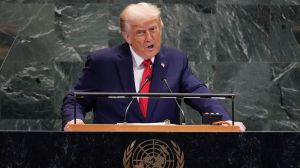You have seen the masked faces, now read their story
In 1999, when Javed Ahmed Bhat dropped out of the Government Degree College in Sopore, Kashmir, and came to Mumbai looking for a job, he tho...

In 1999, when Javed Ahmed Bhat dropped out of the Government Degree College in Sopore, Kashmir, and came to Mumbai looking for a job, he thought he had left all his troubles behind in the militancy-hit Baramulla.
But he was wrong. On October 23, 2001, Javed and three of his friends were picked up by the Thane police, paraded in front of the media as terrorists, charged with possessing illegal arms, and accused of plotting to kill some prominent political leaders.
Their woes don’t end there. Even after being given a clean chit by the Jammu & Kashmir authorities, the Thane police refused to release the four. Now out on bail in Mumbai, they are waiting for the trial to end.
‘‘Back in Kashmir, you are either forcibly recruited by terrorist outfits or employed by the army as informants. Either way you die. Employment in Mumbai seemed like a good proposition,’’ Javed says.
In Mumbai, Javed found a job with a construction company. Life was going as planned till the night of October 23, 2001, when a Thane police team, led by Police Commissioner S.M. Shangari, arrived at the small room provided by the firm to Javed and two other Kashmiri employees — Farooqh Ahmed Bhat and Altaf Hussein Bhat.
The three, along with a guest — Farooqh Ahmed Chopan, a fruit-seller in Navi Mumbai — were just sitting down for dinner. The police bundled up the four — all in their twenties — and took them away.
The next day, the four Kashmiris found out what their ‘‘crime’’ was. Addressing a press conference, Shangari claimed that Javed and his friends were dreaded Hizbul Mujahideen terrorists who were wanted by the J&K Police and that they were on a mission to assassinate prominent political leaders in Mumbai.
‘‘It was only then that we became aware of the fact that we were being labelled as terrorists. We were masked and made to squat before the flashing camera lights. I wanted to stand up and tell everyone that the police were lying. But a cop standing nearby threatened me,’’ recalls Javed.
In November 2001, the four were handed over to the Jammu and Kashmir CID officials. ‘‘We were in the custody of the CID in Jammu for about three months, during which we were interrogated by the CID, CBI, RAW and IB officials. Finally, we were brought back to Thane,’’ says Javed.
In the Thane magistrate’s court, Jammu CID Inspector Mohammad Taj Khan submitted a written statement stating that none of the four youths were wanted by the J&K Police.
The joint interrogations by the intelligence agencies obviously revealed nothing to support the charges pressed by the Thane police.
But the relief was short-lived. The Thane police refused to drop the charges. In court, the police claimed to have found some ‘‘incriminating’’ documents: five issues of Meantime, a monthly published from Delhi, Urdu newspaper Milli carrying pictures of George Bush and Osama bin Laden on its cover, a Mumbai guidebook with a map of the city, and an Urdu magazine which had pictures of national leaders.
‘‘None of these so-called incriminating documents produced before the court by the Thane police are banned. They are all publicly available,’’ points out defence lawyer Shakeb Khan.
But Shangari still finds an excuse to cling on to the case. ‘‘There is one offence registered against one of them in Jammu and Kashmir, and we are pursuing the case on that basis.’’ However, he doesn’t mention the terrorist charges now.
Back home in Saloosa, their village, the villagers are still trying to come to terms with the news from Thane. ‘‘My son was good in studies but poverty forced him to drop out and earn some money. As an educated boy, he found it humiliating to work as a labourer in his hometown so he went to Mumbai,’’ says Mohammed Akbar Bhat, 65, Javed’s father.
‘‘We are cursing the day we allowed him to leave home. We are selling our household goods to meet the legal fees. We even fell prey to touts who guaranteed his release,’’ adds Hajira, Javed’s mother.
Photos



- 01
- 02
- 03
- 04
- 05




























